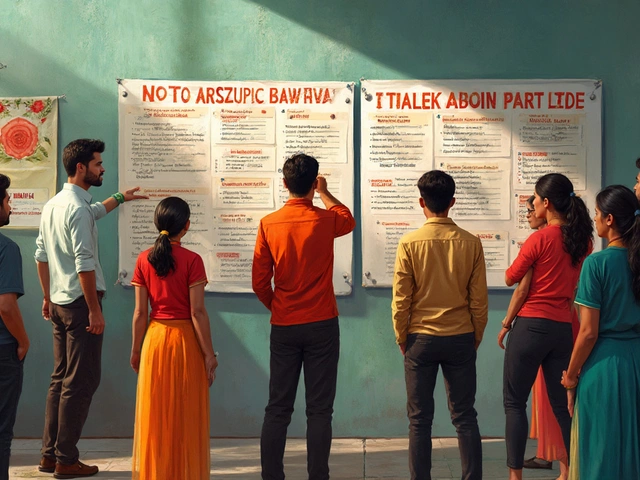Every aspiring engineering student in India is familiar with the daunting rigors of the IIT JEE examination. It is a test that not only challenges your intellect but also your perseverance. With just two years in hand, the pressure may feel immense. Yet, with proper planning and efficient strategies, achieving success is possible.
This article aims to unravel the complexity of preparing for IIT JEE within a two-year framework. We'll dive into the nature of the exam, scrutinize effective study strategies, and provide actionable insights to make the most of your time. It's not merely about hard work; it's about smart work.
- Understanding the JEE Landscape
- Strategizing Your Two-Year Plan
- Selecting Study Resources
- Balancing School and Exam Prep
- Maintaining Motivation and Focus
Understanding the JEE Landscape
The journey to cracking the IIT JEE is as much about understanding the exam's intricate landscape as it is about diligent preparation. The Joint Entrance Examination, or IIT JEE, is considered one of the toughest competitive exams worldwide. It serves as the gateway to the prestigious Indian Institutes of Technology, known for nurturing some of the greatest engineering minds globally. As such, the exam structure itself is designed to be robust and challenging, testing not just rote learning, but the application of concepts in new and varied contexts.
The JEE is split into JEE Main and JEE Advanced. While JEE Main is more inclusive, serving as the initial filter, the JEE Advanced is tailored to sift out the crème de la crème of candidates. JEE Main consists of multiple-choice questions covering Physics, Chemistry, and Mathematics, disciplines integral to any engineering curriculum. The questions often emphasize problem-solving skills and critical thinking rather than mere factual recall. Every year, over a million students appear for JEE Main, but only a fraction progress to JEE Advanced. This two-tier system ensures that those who eventually make it to the IITs are thoroughly prepared for the rigorous coursework that follows.
Interestingly, the syllabus for JEE largely overlaps with the high school syllabi for these subjects, but the level of questions tends to be significantly higher. An understanding of the competition's format is vital. JEE examiners are known for crafting questions that cleverly integrate multiple concepts into a single query. It's not uncommon to find questions designed to test principles from all three subjects within a single problem. Thus, a solid grasp of fundamentals, as well as the ability to think laterally, is essential for success. A recent survey noted that successful JEE candidates often exhibit an aptitude not only for quick calculation but for visualizing complex problems, suggesting that visualization skills can be just as crucial as computational ones.
Preparation for JEE isn't merely an academic endeavor; it's a test of endurance. Effective time management and study strategies become pivotal. Renowned IIT alum Dr. Kumar once stated,
"The IIT JEE is not just an exam but a way of life. Excellence is not an act but a habit."This speaks volumes about the dedication required to master the exam. The competitive nature of JEE ensures that the stakes are high, with significant pressure to perform well. Thus, understanding the structure and focus areas of the exam can be uplifting for aspirants, allowing them to anticipate challenges and prepare accordingly.
Strategizing Your Two-Year Plan
Tackling the formidable IIT JEE exam with a two-year timeline requires a strategic blueprint. This period can be a considerable span if one approaches it wisely, combining time management, effective study strategies, and motivation. Initially, it's crucial to grasp the exam's structure, which encompasses a myriad of concepts in Physics, Chemistry, and Mathematics. Understanding the weightage each subject and topic holds can guide your preparation, allowing concentrated efforts where it matters most. Developing an intimate familiarity with the syllabus early on in your journey can save you from unnecessary detours.
To break down this timeline effectively, think of it in two phases. The first year could be dedicated to building a strong foundation. This is where you focus on thoroughly understanding concepts and regular practice to cement these basics. Engage with quality study resources, as they play a pivotal role in shaping your foundational knowledge. It's during this phase that you can experiment with different study methods to find what fits best for you, ensuring that you are both comfortable and challenged in your approach.
As you transition into the second year, shift gears towards rigorous practice and application of the concepts. This is where practicing previous years' papers and mock tests becomes indispensable. They not only help in identifying weak areas but also in boosting confidence as the exam day approaches. A strategic plan during this period can involve revisiting and revising subjects systematically. A famous quote by Abraham Lincoln that resonates here:
"Give me six hours to chop down a tree, and I will spend the first four sharpening the axe."The importance of preparation cannot be overstated.
Moreover, assigning monthly goals can serve as a powerful motivator. These goals should be realistic, yet slightly challenging, compelling you to stretch beyond your comfort zone. Another important aspect is interspersing your academic endeavors with some semblance of balance. It is vital to schedule time for relaxation and hobbies to prevent burnout, which is common in competitive exam preparations. This keeps your mind fresh and ready to absorb new challenges daily, ensuring high exam success
Real-Life Examples and Statistics
In the realm of IIT JEE preparation, data suggests that students who meticulously planned their two-year journey fared better in exams. Let's take a moment to examine a simple plan:| Year | Activity Focus |
|---|---|
| First Year | Concept Building and Basics |
| Second Year | Rigorous Practice and Application |
Implementing this plan allows a student to finish the syllabus comfortably before devoting ample time to revision and mock tests in the latter half of the second year. Such a structured approach, with set benchmarks along the way, provides clarity and a sense of direction, crucial for sustained progress. Planning daily study sessions to include short breaks can further enhance productivity by limiting distractions and helping maintain focus. Two years is enough to manage time effectively if you commit to your plan and remain flexible to adapt as needed.

Selecting Study Resources
Embarking on a two-year journey to conquer the IIT JEE requires access to the best resources available. The choice of study material can make or break your preparation, influencing both your understanding and performance. To make the most out of your two years, one must carefully select resources that align with their learning style and the exam's demands. Renowned books like H.C. Verma's 'Concepts of Physics' offer deep insight into crucial topics, while 'Arihant's Mathematics Series' might capture your attention for its problem-solving techniques. Both are known for their detailed exposition and practice questions that hone your analytical skills.
Study resources are abundant, but it's essential to separate the chaff from the grain. For Chemistry, 'Organic Chemistry' by Morrison and Boyd is celebrated for its clarity and depth, covering fundamental concepts along with advanced topics needed for the exam. To complement these traditional books, the rise of digital platforms provides an interactive arena for study. Websites like Khan Academy and YouTube channels dedicated to IIT JEE preparation offer videos that break down complex ideas into simpler components, making learning more engaging.
Students often gain insights from peer recommendations and expert reviews. An invaluable piece of advice from educators is to avoid spreading oneself too thin across numerous resources. Sticking to a select few that thoroughly cover the syllabus can lead to better retention and understanding. Utilizing previous years’ papers and sample questions to test your knowledge frequently is crucial. They give a real-time sense of the exam format and the type of questions to expect.
According to a survey by Career360, about 70% of successful candidates highlighted mock tests as vital to their strategy. Regular practice exams help in self-assessment, allowing students to identify weaknesses and improve them over time. They're invaluable for managing exam pressure and timing. Incorporating online test series offered by platforms like Embibe can be particularly useful for assessing progress and gaining familiarity with the exam pattern in a competitive environment.
Remember, the decision to choose specific resources should align with personal strengths and weaknesses. Adjust your approach based on what feels effective for you. Consistent reviews and feedback loops, where one adjusts study materials as needed, ensure that your preparation remains dynamic and responsive.
Balancing School and Exam Prep
For those preparing for the IIT JEE, balancing everyday school studies with exhaustive exam preparation can seem like a formidable task. However, it's essential to remember that success in the JEE exam demands a strategic blend of both. Schools often cover foundational aspects that serve as a groundwork for the more advanced concepts you will tackle in JEE preparation. Aligning school studies with JEE topics can offer double benefits: reinforcing subjects needed for school exams while simultaneously filling any gaps for JEE.
Time management becomes your best friend when balancing these two demanding tasks. Consider creating a weekly schedule that delineates time slots for school homework, projects, and dedicated JEE study periods. Prioritize by identifying school topics that overlap with the JEE syllabus, thereby optimizing your study sessions. Evaluate which subjects necessitate more focus, especially if they're weighty in both school exams and JEE scores, such as Mathematics and Physics. Remember, consistency is key; setting aside a regular time each day for JEE-focused study can enhance retention.
Incorporating School Resources
Your school teachers can be vital allies in your preparation journey. They offer insights that textbooks might miss and can clarify doubts that arise from your JEE-level study materials. Engage with teachers during and after classes, harnessing their expertise to strengthen your understanding. Additionally, form study groups with peers; collaborative learning can lead to better comprehension and retention. School resources like libraries and lab facilities add further hands-on experience crucial for acing subjects like Chemistry.
"The beauty of studying for competitive exams alongside school lies in the symbiosis of learning," says Professor Kamal Shah, a renowned educator and IIT alumnus.
It's also beneficial to utilize school breaks effectively. Use them to revise or tackle challenging JEE topics. After-school hours or weekends can be dedicated to full-length mock tests. Such practices provide a real-time assessment of your preparation level, accentuating areas that need improvement. Testing under timed conditions helps simulate the exam day experience, curbing anxiety and improving time management for the actual JEE.
Dealing with Stress
Balancing dual responsibilities can lead to stress, so it's important to infuse relaxation techniques into your routine. Daily practices like meditation or yoga can improve focus and reduce stress. It's also vital to ensure you're taking breaks amidst rigorous study schedules. Engage in hobbies or activities that bring joy, helping to rejuvenate your mind. A healthy lifestyle, including a balanced diet and ample sleep, contributes significantly to academic performance. Ignoring health can lead to burnout, which is counterproductive for JEE success.
While it may seem daunting at first, balancing school and JEE prep can become manageable with focus and consistency. Many students have tread this path successfully, proving it possible with the right attitude and strategy. Approach each day with a positive mindset and an eagerness to learn, and this balance will become your stepping stone to achieving your IIT dreams.

Maintaining Motivation and Focus
Staying motivated during the intensive IIT JEE preparation journey is like running a marathon. It requires persistence, patience, and the right mindset. Without a doubt, every aspirant hits snags that test their willpower. Balancing two years of preparation demands more than just academic excellence; it necessitates mental resilience. One effective strategy is setting clear, achievable goals. These goals act as compass points, guiding you through jungles of confusion and demotivation. For instance, breaking down big tasks into small, manageable victories — like mastering one chapter per week — boosts your confidence and provides a sense of accomplishment.
Creating a structured timetable is another crucial tactic. This timetable should consider your biological prime time, the time of day when you are most alert and focused. Once identified, schedule your highest priority study sessions during these periods. More so, remember to intersperse study sessions with short breaks. Many psychologists advocate for the 'Pomodoro Technique', where you study for 25 minutes followed by a 5-minute break, which refreshes your mind. A famous quote from Charles Duhigg states,
"Strong habits are instrumental in providing willpower for critical tasks."Thus, cultivating a balance between structured routines and relaxation fosters long-term concentration and avoids burnout.
Engaging with peer groups can also bolster your preparation journey. Peer interactions oftentimes open doors to fresh perspectives on the same subject matter. Often, study groups serve as platforms for mutual encouragement, leading to the sharing of resources and insights that enrich the learning experience. Moreover, peer motivation can elevate personal dedication. Beyond academics, maintaining a hobby or engaging in physically enriching activities keeps stress at bay and feeds your mental well-being. Regular exercise, yoga, or even breath-focused meditation significantly enhance focus and can be rejuvenating for both mind and body.
Sometimes, amid a sea of textbooks, it's easy to lose sight of the end goal. Regularly visualizing your ambitions can reinvigorate your determination. Think about what success means to you; is it the self-contentment of cracking the exam or securing a cherished seat in the coveted IITs? Such visualizations not only remind you of your goals but also provide the necessary fuel to rekindle your drive. Another powerful tool is to keep a study journal. Documenting your daily progress in a journal can encourage reflection and provide insights into your study habits. Over time, this reflection aids in identifying what works and what might need fine-tuning for better efficiency.
In the modern labyrinth of digital distractions, technology itself can be both a bane and a boon. Apps that block distracting websites or track your study hours can significantly improve your focus. It's essential to create a conducive study environment that minimizes interruptions. Whether it's a cozy corner in your home or a serene spot in a library, finding a personal study haven can dramatically enhance concentration levels. Ensuring this balance of technology and environment protection can greatly amplify your efficiency.
Yet, perhaps one of the most underrated facets of exam preparation is the art of self-compassion. Mistakes and setbacks are part of the learning curve. Embrace these moments as stepping stones to growth rather than debilitating obstacles. By fostering a positive self-dialogue and rewarding yourself for even small successes, you nurture a motivational groundwork that is resilient and enduring. As you journey through these preparation years, remember that mastering the techniques to maintain motivation and focus is a vital skill that will serve well beyond the IIT JEE.





